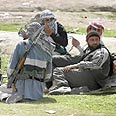
'Islamic world in cold war'
Israeli experts: Shiite-Sunni conflict dramatically escalated in recent months, Sunnis obsessed with Iranian threat
Dr. Uzi Rabi, of the Department of Middle Eastern and African History at Tel Aviv University, said both Iran and Sunni nations were sending envoys to battle it out in Iraq.
"There are many reports of Saudi Arabia indirectly supporting al-Qaeda, in order to prevent a Shiite takeover of Baghdad," Rabi said.
"There is a cold war going on in the Middle East between the agents of Iran and Sunni states," he argued, adding: "pragmatic Arab states, such as Saudi Arabia, Egypt, Jordan, and the small Gulf states, have recently joined into a bloc aimed at checking the Shiite phenomenon sweeping the Middle East."
He added that for the first time in Israel's history, there was a possibility for the country to "partially join this Sunni strategic alliance."
Rabi cited Egyptian President Hosni Mubarak, who said in a speech that Shiites that live in Arab states were disloyal to their home countries, and saved their allegiances for Iran. "Jordan has also warned of the Shiite axis stretching from Iran to the Mediterranean that could split the Arab Muslim heart of the area," Rabi noted.
He stressed a massive growth of anti-Shiite reports in the Sunni media, and an "obsessive" level of coverage on the alleged attempt by Shiites to convert Sunnis to Shiism. "I am amazed by the volume of reports on this," Rabi said.
"There is a sea of articles on the Shiite danger. Sunni states have called for collective action to stop the Shiites, and may even begin nuclear programs to counter the Iranian threat," he added.
Rabi said the Sunni states also used the pretext of a Shiite threat to crack down on radical Sunni opposition groups at home.
"The conflict between Shiites and Sunnis is not a passing phenomenon. This conflict has crossed the borders of Iraq," he concluded.
Iran seeking access to border with Israel
Earlier, Professor David Menshari, an expert on Iran at Tel Aviv University, said the Islamic Republic was seeking to spread its influence to any area in the Middle East that was not strong enough to repel it, with the Palestinian Authority being a prime example of such a region. "Hamas can help Iran link up to the border with Israel," Menshari said. "Wherever the ground gives way, Iran can be found. They go after the soft targets, such as Lebanon, Gaza, and Iraq, but stay away from the strong countries," he stressed.
Menshari added that "to believe that there was homogenous body of Shiites, a unified axis, would be doing ourselves an injustice."
He cited many voices within Iran that were opposed to the government of the ayatollahs, saying: "There is a series of religious leaders in Iran opposed to clerical control of the state."










